Life With UDI
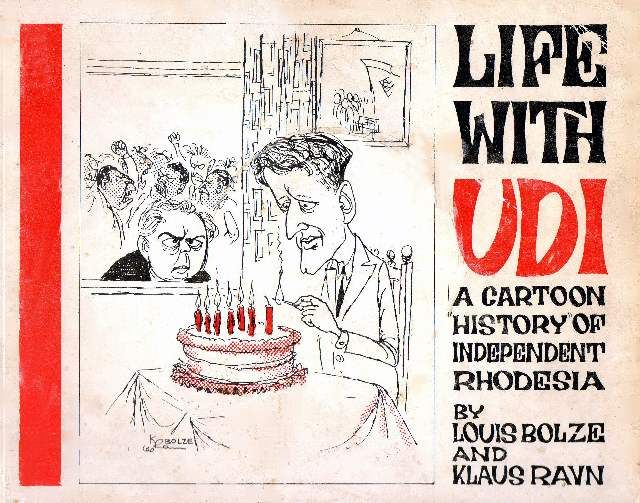
LIFE WITH UDI - A CARTOON HISTORY' OF INDEPENDENT RHODESIA
BY
LOUIS BOLZE AND KLAUS BOLZE
FIRST SERIES
Published by
LOUIS W. BOLZE,
P.O. Box J 994, Bulawayo, Rhodesia.
Made and printed in Rhodesia by
Mardon Printers (Pvt.) Ltd.,
P.O. Box 55, Salisbury.
Copyright ® 1966, vested in the joint authorship
Louis Bolze and Klaus Ravn.
First Impression, June, 1966
Second Impression, July, 1966
ACKNOWLEDGEMENTS
The authors wish to acknowledge, with appreciation, the ready help and co-operation given by:
The publishers of the Sunday Mail, Salisbury Salisbury,for permission to reproduce five cartoons which were originally published in that newspaper.
The management of The Chronicle, Bulawayo, through its library staff, who assisted with the reference material.
The staffs of the National Free Library of Rhodesia, Bulawayo and that of the Bulawayo Public Librry in tracing pictorial references.
The Ministry of Information's office in Salisbury and Bulawayo in providing texts of Ministerial statements and photographs.
Mrs. Enid Bolze, who spent many hours checking references and dates.
Mr. John Fowler, who took the photograh below.
This book is dedicated to the people of Rhodesia, whose splendid spirit has triumphed over unequal odds; also to the thousands of warm-heated South Africans, and growing number of friends throughout Southern Africa and many other parts of the world, whose generosity is surpassed only by the great depth of their moral support.
LET US GO FORWARD
"OUR road lies neither to the right nor to the left . . . our policy is to go forward. In the fourteenth and fifteenth centuries, Portuguese seamen designed or developed the caravel which enabled them to hold a course even when faced with head winds.
It is easy to run before the wind and that is why politics, in the lowest acceptance of the term, is usually synonymous with opportunism. But a true statesman does not let himself be blown hither and thither by the winds of current events; rather does he make use of them to lay and follow that course
which is most useful to his country, just as our seamen did in past ages. This demands wisdom, in certain cases even genius—a gift likely to be found in a country with a long civilising tradition."
—ARMANDE CORTESSAO.
The Authors
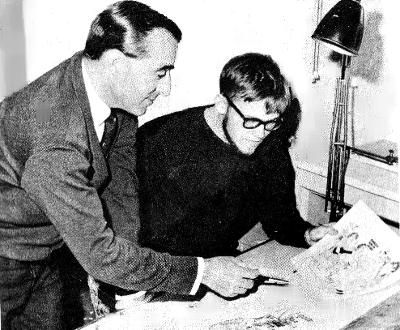
LOUIS BOLZE AND KLAUS RAVN.
Photo: JOHN FOWLER.
Klaus Ravn
Klaus Ravn is youthful, slightly built and of quiet, almost timid, manner, but he has a bold talent, a king-size wit and an even bigger future as a cartoonist.
....
Born in Denmark 21 years ago, he came to Rhodesia with his farmer parents when he was eleven. He received his high school education in Salisbury and Bulawayo, where he now lives, and in 1964 he dropped his C.I.S. studies to become a commercial artist. Except for normal high-school drawing instruction, his art is self taught.
The urge to cartoon first found somewhat frustrated expression, spare-time, via several sketch books. His early style was macabre, his characters the distorted, twisted people of the off-beat world.
Ravn humour had one ghost saying to another: "I have a most frightful hangover; I was hanged yesterday."
Ironically Klaus's first rejection slip was received from his hometown newspaper. The break-through came only seven months ago when The Sunday Mail, Salisbury, published one of his cartoons.
Others have followed.
His work in Life With UDI shows a more mellow and endearing style, his wit and keen sense of fun shining brightly through its pages. From rejection slip to 90-cartoon volume is jetting places and should win for him the distinction of being acknowledged as Rhodesia's "Cartoonist Laureate".
It is hoped that his talent, here being used in the service of Rhodesia, will bring pleasure to many through the wide international readership to which this book will introduce him.
Louis Bolze
Louis Bolze is a third-generation South African who came to Rhodesia fourteen years ago. He was born in Queenstown in 1919, and was educated at Dale College, Kingwilliamstown.
Before moving to Rhodesia, he held posts in the Chief Civil Engineer's Department, and later the Journalistic Section of the Publicity and Travel Department, South African Railways. His five years' war service took him to East Africa, the Middle East with the Eighth Army, and to Italy.
On coming to Rhodesia he entered the hurly-burly of commercial life, spending ten years with a firm of leading publishers of trade journals. For the greater part of this time he was associate editor at the company's Bulawayo office, and managed the Building Bureau.
He had a close association with Rhodesia's industrial life which led him, four years ago, to establish the Rhodesian Products Bureau, the first permanent exhibition of Rhodesian-made goods —now an offshoot of the Central African Trade Fair.
Since 1964 he has held an appointment as Public Relations Officer with a large organisation.
Louis lives with his wife and two Rhodesian-born sons in the pretty precincts of Bulawayo's Hillside Dams. He is proud of the fact that his grandfather served Rhodesia in the Matabele Rebellion in 1896. He has implicit faith in the country's future greatness, particularly in the industrial and tourist potential of Bulawayo.
The idea of producing Life With UDI was his, as are the layout, captions and presentation of the material. He is the author of all except ten of the cartoon ideas, these having been passed on in
descriptive manuscript form to Klaus Ravn for illustration.
Life with UDI
WHEN, in the first century A.D., Pliny the Elder said that there was always something new out of Africa, he probably did not have Rhodesia particularly in mind.
However, true to his dictum Rhodesia since assuming Independence—colloquially known as UDI—has produced many new things and situations. For instance, we now live with petrol rationing (27); local manufacturers have produced a four-seater bicycle (45), clothes pegs and lollipop sticks; there were groundless fears of a whisky shortage (20) a real one of cornflakes (48), and there was the threat to the very foundations of our womanhood when they nearly ran out of step-ins (33).
Now comes Rhodesia's first-ever "history" in cartoons. This "history" humorously, but faithfully, records the major events of the past half-year, and depicts the trend of international attitudes immediately prior to the Declaration of Independence on 11th November, 1965.
Because these months have been so eventful, the cream has been skimmed in the interests of publishing economics. We apologise to those who feel cheated at the omission of the "sugar ship", the pranksters who exploded a firework near the Glosters at Francistown, and of the proposed R.A.F.- Rhodesian darts match on the banks of the Zambezi. This should not be construed as a careless disregard for historical detail.
This period has been marked by several unfortunate visitations. Coinciding with the "Great Caine Robbery" (26) and the imposition of sanctions, the country experienced one of its worst-ever droughts (36). Overseas newsmen (13),some honourable others not, dropped out of the African sky like a swarm of locusts, to be followed by the Censor (21) who, in the early days, left one's morning newspaper with gaps like a seven-year-old's tooth-line. Mr. Bottomley came once, Mr. Wilson once. The Royal Commission didn't make it.
Some visiting newsmen were remarkably well equipped. One had a telephoto lens so powerful that when trained on a Rhodesian street scene to photograph incidents of alleged rioting and bloodshed, it recorded tram-cars known to run in the Congo, nearly 1,000 miles away. Another had a TV camera with the ability to project itself into the past. Whirring away at a local departmental store, it showed it burning furiously—an event which had occurred accidentally several years before. However, all this made good "threat-to-world peace" and "explosive-situation" (9) stuff so eagerly consumed in some gullible overseas quarters.
This "history" is in itself unique. Cartoon books are usually the re-published drawings of a professional Press cartoonist. This is the work of two free-lances, done in spare time and completed, from start to finish, in two months.
Although the "history" is light-hearted, it has its serious appeal, and a few hard-hitting gibes. The main characters are, quite naturally, Mr. Smith and Mr. Wilson, with the latter playing the villain.
Others who have appeared on Rhodesia's post UDI stage will be readily recognised. There are the British "diplomat spies", slinking around the precincts of Beitbridge (40) on the trail of petrol-runners, one of whom, in response to an enquiry of a South African driver, elicits the response that he is ferrying "cold tea" (51).
"007" later turns up at the Wankie Game Park (67) in search of the Springbok (not the Tiger? note) in the petrol tank. Had he been better informed on African wild life he would, of course, have known that the springbok has its habitat elsewhere.
"007" and his colleagues also turn their attention to the secret tobacco sales (60), only to be outwitted by Rhodesian know-how and eager back-door buyers (52, 35 and 61).
Despite the mild dig at the inertia of some Rhodesian manufacturers (80) in pursuing export opportunities, the cartoonists have acknowledged the tremendous contribution made by Rhodesian industry. It recognises the diversification of industry (64, 38) and its splendid support of the Central African Trade Fair (86), where it was "business as usual".
The most colourful thread running through the "history"
is the oil embargo. There are the "pirate" (37) and "ghost" (46) ships, and the subsequent arrival of the oil tankers (76) which successfully circumvented Mr. Wilson's "Destroy-Rhodesia Plan", until he ran to the UN for assistance.
Interwoven in the story is the splendid help received, in a variety of forms, from South Africa (72), the dedication of this book being a token of Rhodesia's appreciation of their gesture magnificent. At the time of going to press, practical assistance had started arriving from the Portuguese in Mozambique. Their role, and that of other newly won friends, we hope to have the pleasure of featuring in part two of the "history".
Interspersed with the laughs at ourselves are a few thought- provoking cartoons which could be interpreted as lampooning the African. This is not intended. The satire is directed, not at our black fellow Rhodesians nor, indeed, at the African people anywhere. It is a blow struck in self-defence against the nationalist extremist in those African countries which have the effrontery to interfere in the peaceful administration of Rhodesia (8) which, after South Africa, is the most stable, most highly developed and advanced country in Africa, educationally, agriculturally, industrially and in general standard of living of all its peoples.
The world has taken far too much notice of the immature rantings and tantrums of the newly-emerged African states, most of whom have been accorded a status in the councils of the world justified neither by their level of maturity, merit, ability, nor sense of responsibility. Most exist only by courtesy of the largesse bestowed on them (the wheel of the wagon that squeals the loudest gets the most grease) by countries whose generosity exceeds their powers of sound judgement. That this is so is their affair until they try to impose their incompetence on us. At this point Rhodesians say, "so far, no further!"
Rhodesians have no national ambitions beyond the energetic development of their land and its rich potential for the benefit of black and white. That they have already succeeded in large measure in this ideal is borne out by the mutual respect and trust which exist between the races. Were it otherwise the so called "settlers", many of whom were born here, would never be tolerated by the nearly 4,000,00 black Rhodesians.
"Freedom fighters" from across our borders, (87) with ambitions to "liberate" Rhodesia, will doubtless find to their cost that they can expect little or no succour from the mass of Rhodesian Africans. For this reason, and because the majority of Rhodesian Africans prefer the peace they now enjoy and the contentment of their work, the efforts of the "liberators" are unlikely to succeed.
Gladstone once said: "Decision by majorities is as much an expedient as lighting by gas." Today rule by majority (23) is a political philosophy endorsed by all and sundry. Great virtue is placed in the magical qualities of numbers—the more heads the merrier, regardless of what's in them!
This unruly plant of majority rule, nurtured in certain hot houses overseas, is what inexperienced gardeners, unfamiliar with Africa and its thought-processes, wish to transplant to Rhodesia—sooner than later. That it has failed to flourish elsewhere on this continent seems of little consequence.
Those genuinely interested in the welfare of the African in Rhodesia can best assist him by backing what is already being done in the fields of education and water-conservation. Here lie our greatest needs. Rhodesia has a fine record of self-help in these directions but more, much more, must be accomplished quickly.
To true friends of Rhodesia we would say, "Come and see for yourself; better still, come to stay." This is a land of great opportunity. Guns may be left at home; they won't be needed here. They are for the sophisticated, "peaceful" communities like London and New York and some of the countries of "liberated" Africa.
If this book has a serious message, that is it. But it was conceived as a book of fun—to show the world that, despite the tightening of the screw, Rhodesians are in good heart and more determined than ever to preserve their liberty . . . that they have enough resilience to come up laughing—at themselves. Rhodesia's motto today we suggest is: U-DI laughing!
L.W.B.
26th May, 1966.




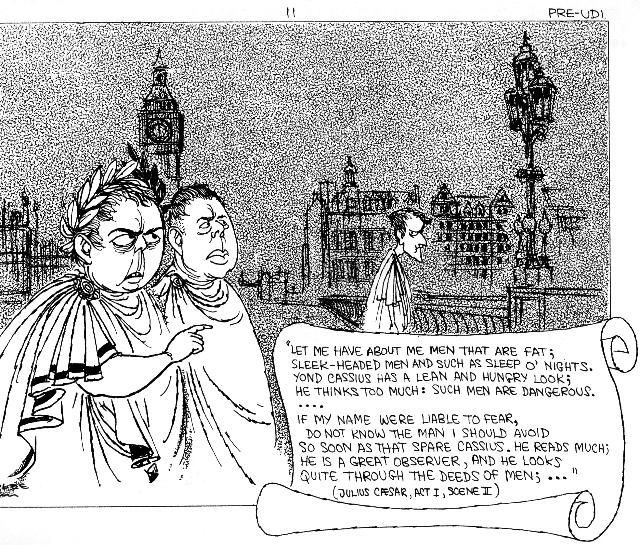
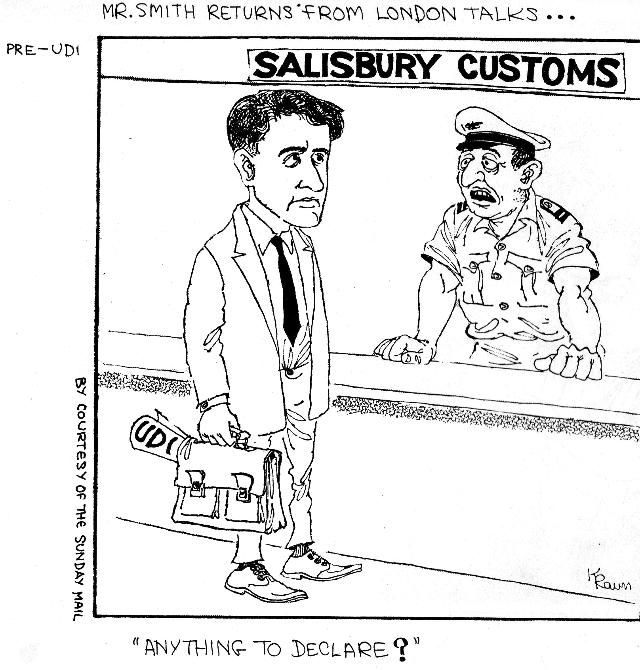
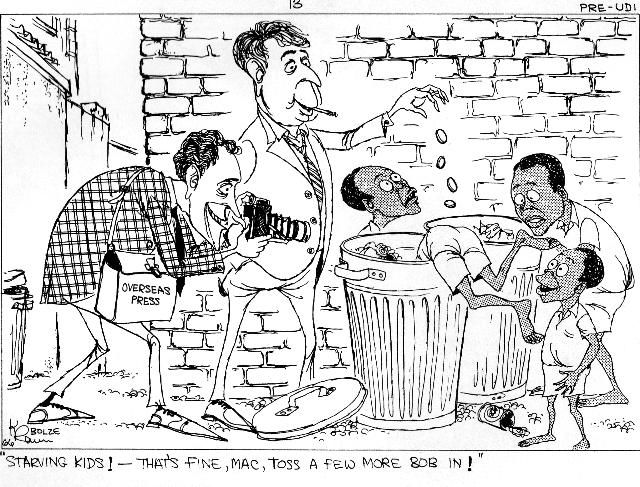
" There is a tide in the affairs of men
Which, taken at the flood, leads on to fortune;
Omitted, all the voyage of their life
Is bound in shallows and in miseries.
On such a full sea are we now afloat,
and we must take the current
when it serves,
Or lose our ventures."
Julius Caesar, Act IV, Scene III
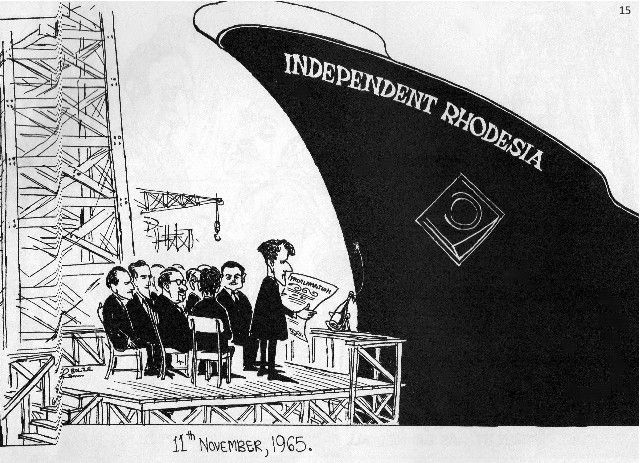
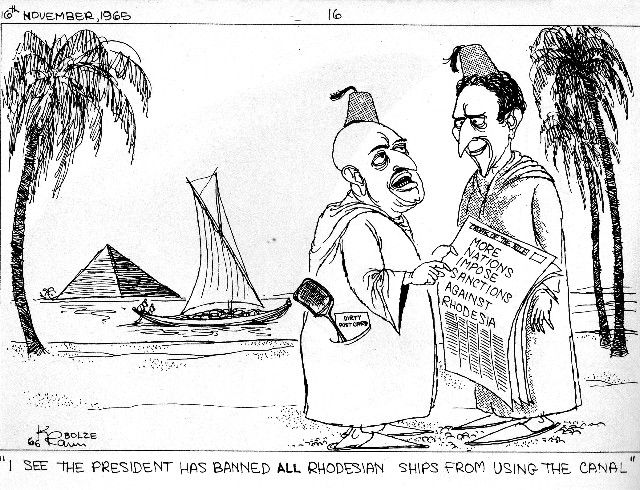
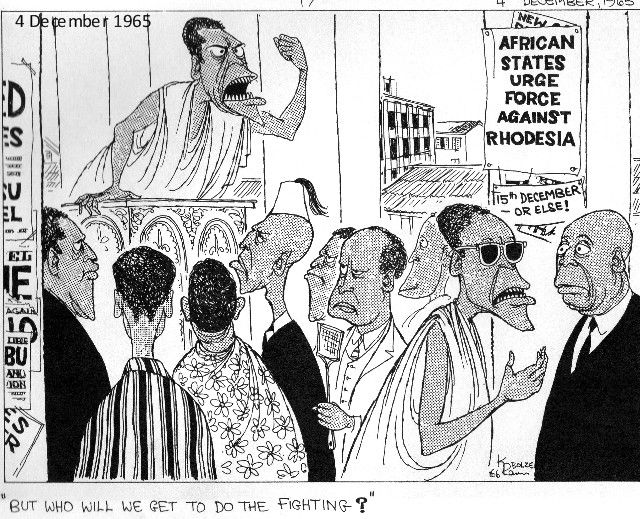
SHIP OF STATE
" Thou, too, sail on, O Ship of State!
Sail on, O Union, strong and great!
Humanity with all its fears,
With all the hopes of future years.
Is hanging breathless on thy fate!
We know what Master laid thy keel,
What Workmen wrought thy ribs of steel,
Who made each mast, and sail, and rope,
What anvils rang, what hammers beat,
In what a forge and what a heat
Were shaped the anchors of thy hope!
Fear not each sudden sound and shock,
'Tis of the wave and not the rock;
'Tis but the flapping of the sail,
And not a rent made by the gale!
In spite of rock and tempest's roar,
In spite of false lights on the shore,
Sail on, nor fear to breast the sea!
Our hearts, our hopes, are all with thee,
Our hearts, our hopes, our prayers, our tears.
Our faith triumphant o'er our fears,
Are all with thee,—are all with thee!"
—Longfellow
from "The Building of the Ship".
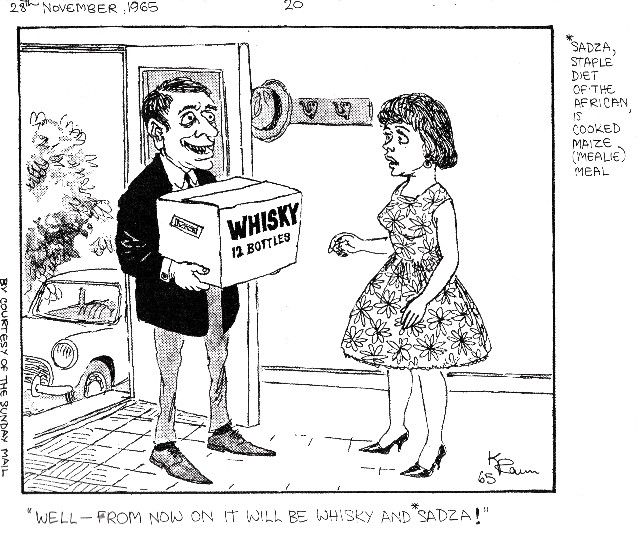
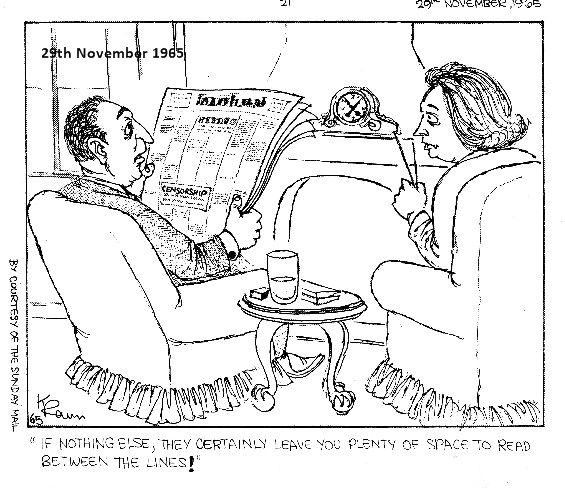
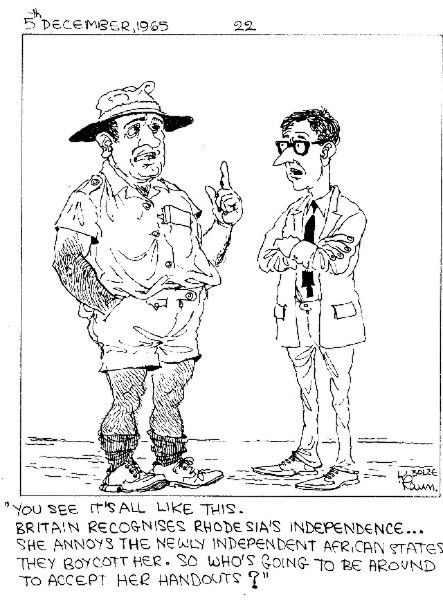
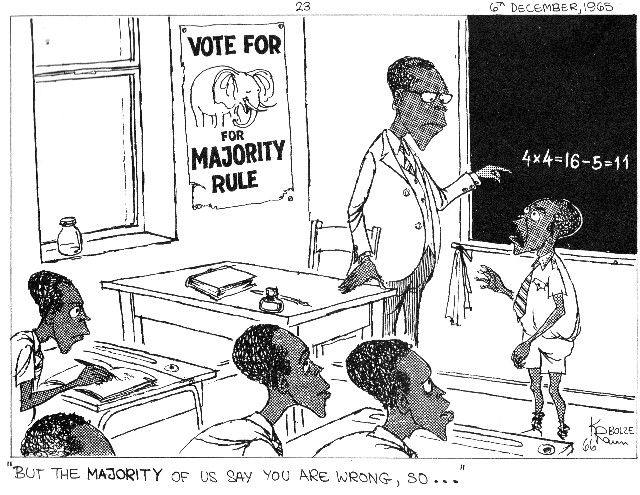
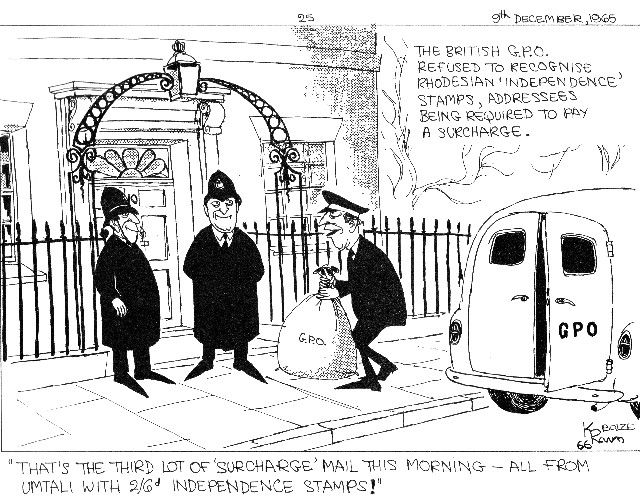
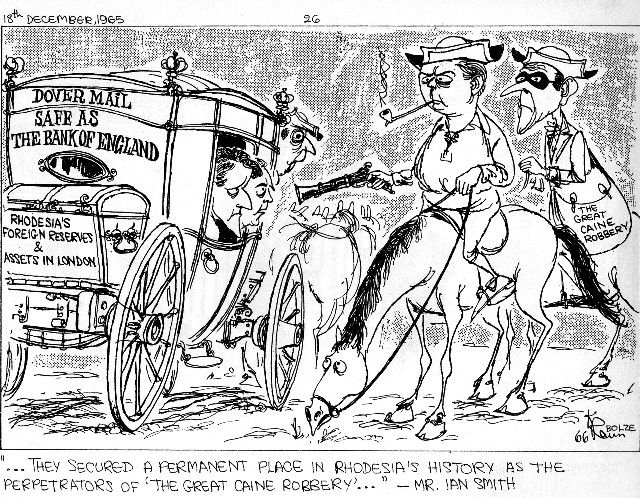
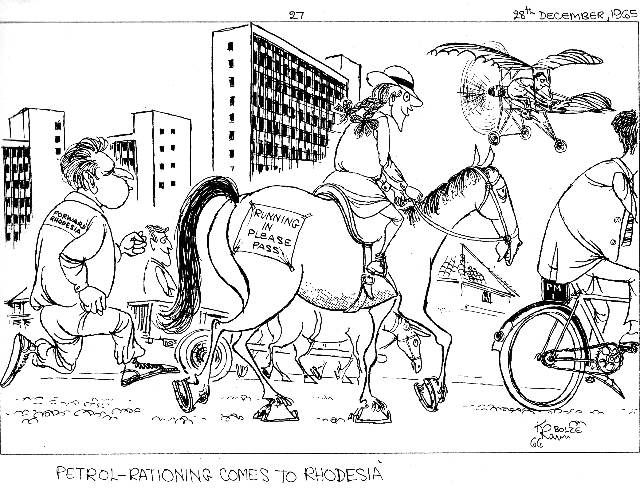
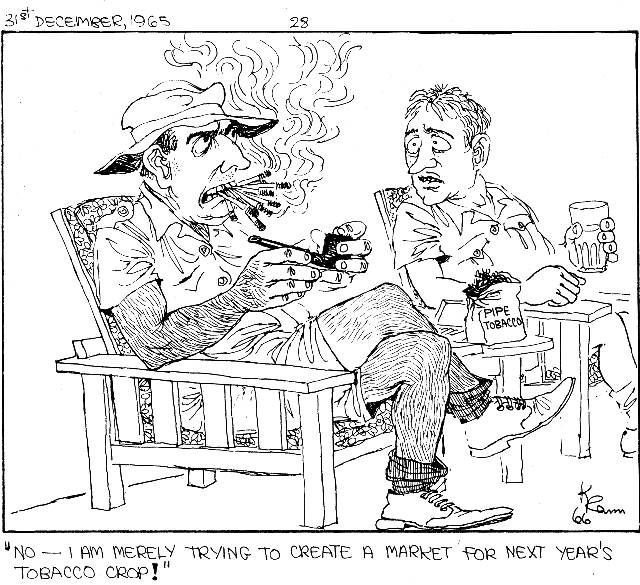
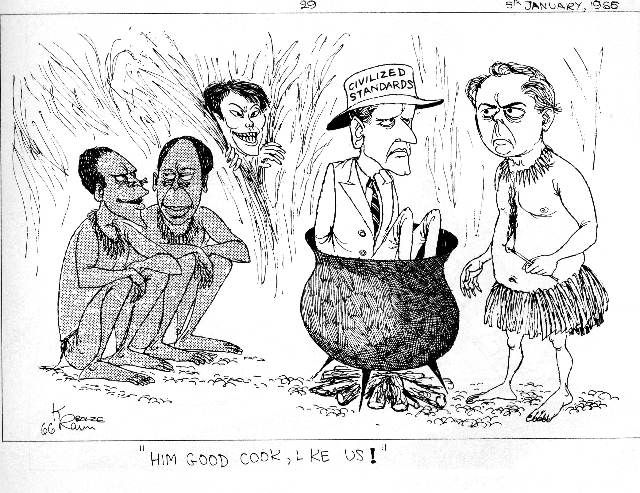
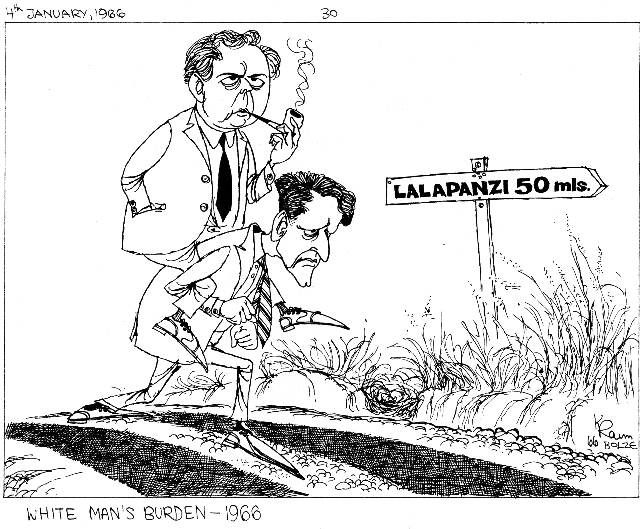
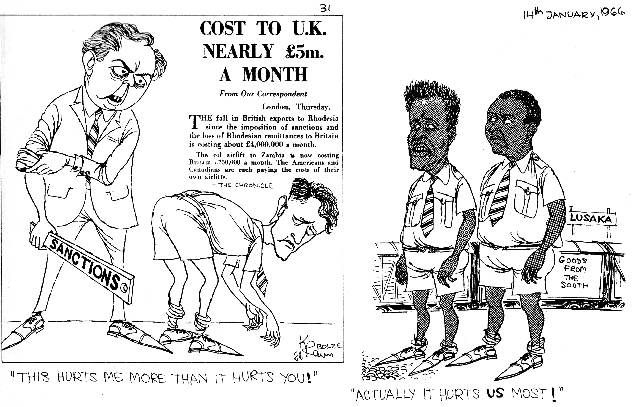
Text reads:
COST TO U.K. NEARLY £5m. A MONTH
From Our Correspondent
London, Thursday.
THE fall in British exports to Rhodesia since the imposition of sanctions and the loss of Rhodesian remittances to Britain is costing about £4,000,000 a month.
The oil airlift to Zambia in now costing Britain £750,000 a month. The Americans and Canadians are each paying the costs of their own airlift!:.
-THE CHRONICLE
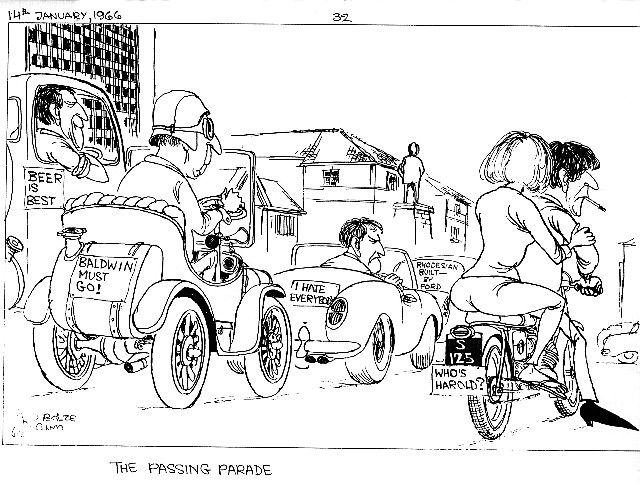
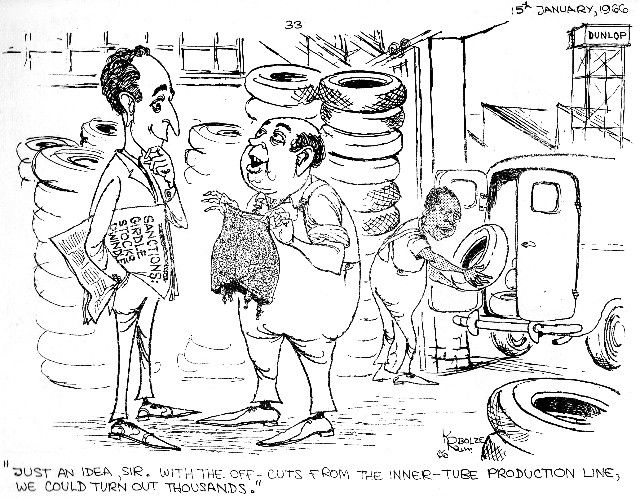
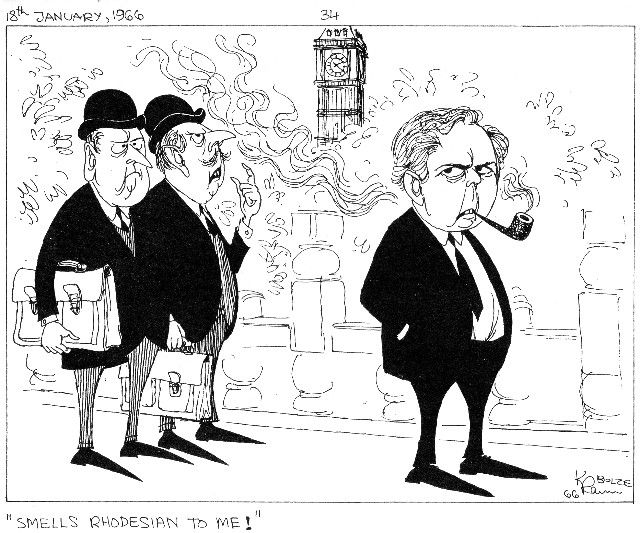
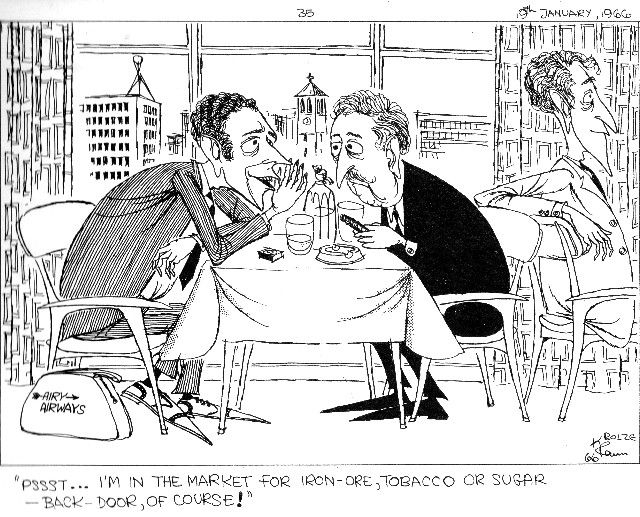
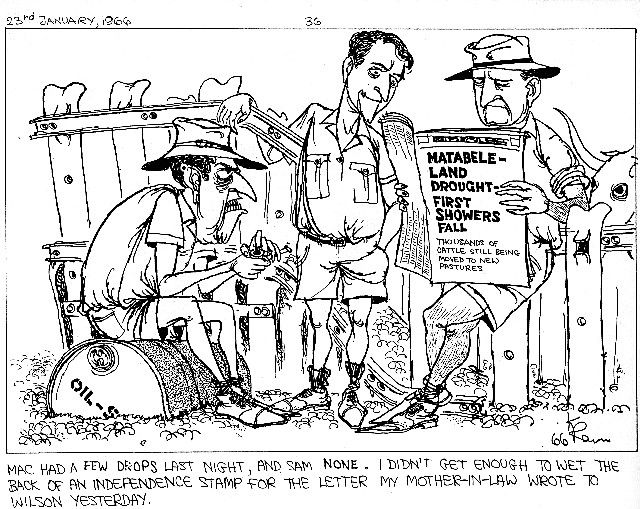
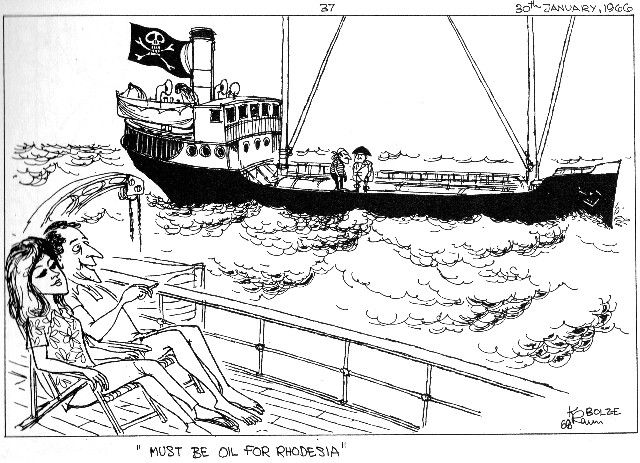
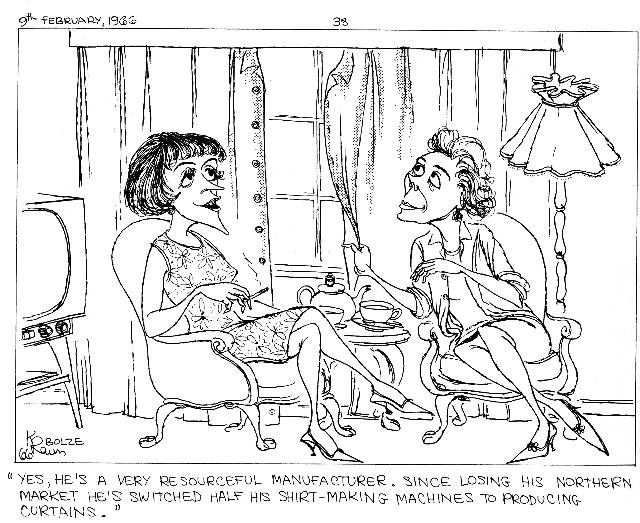
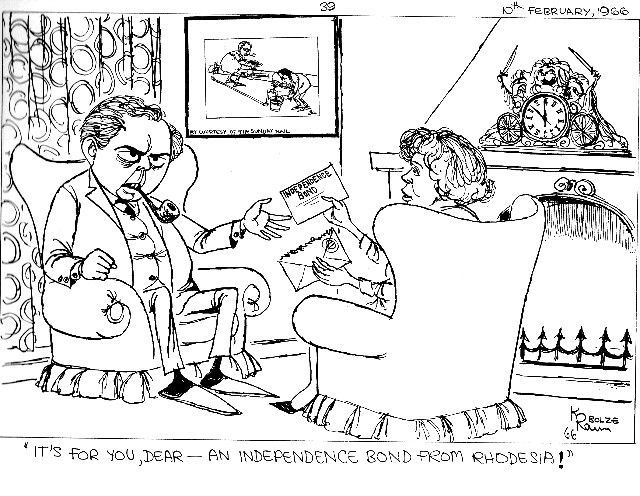
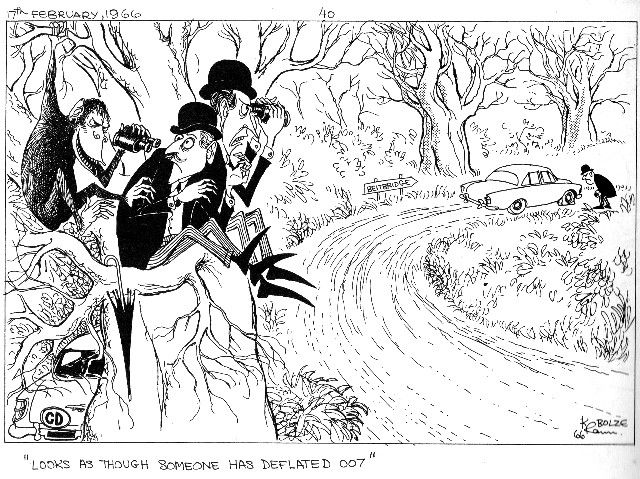
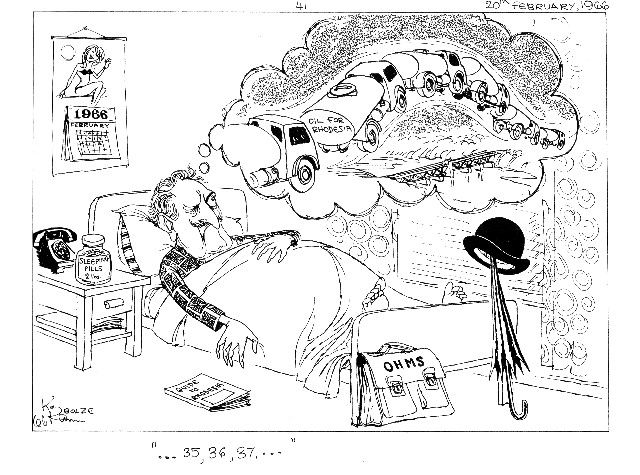
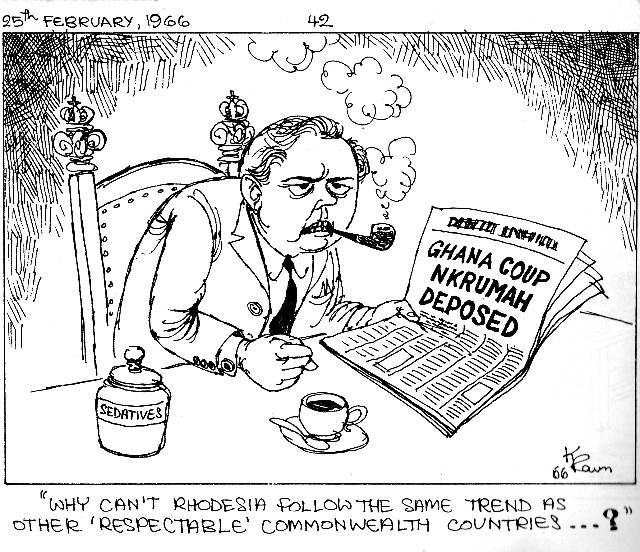
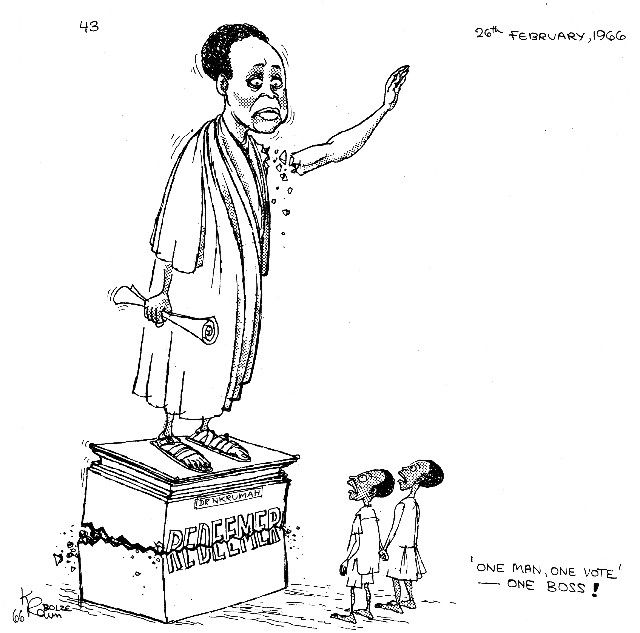
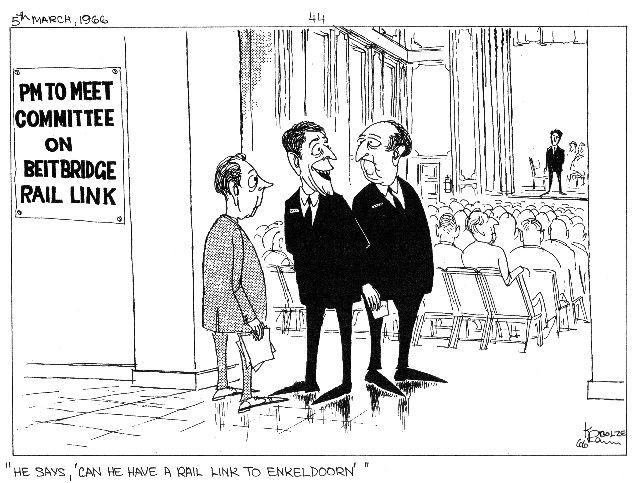
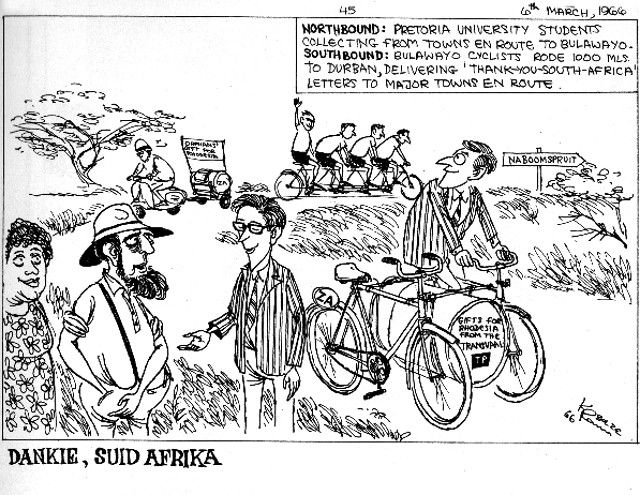
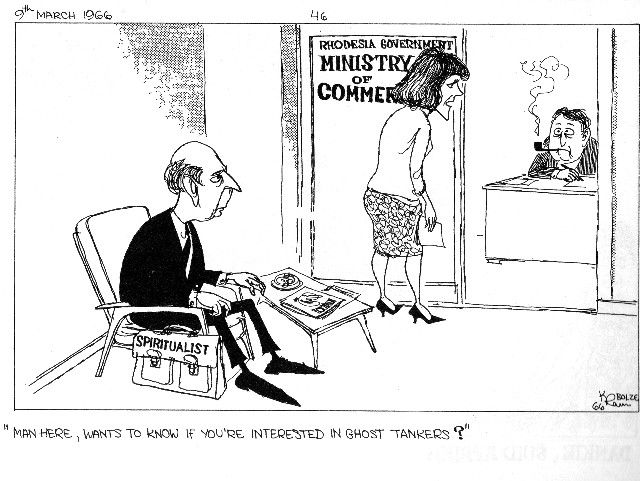
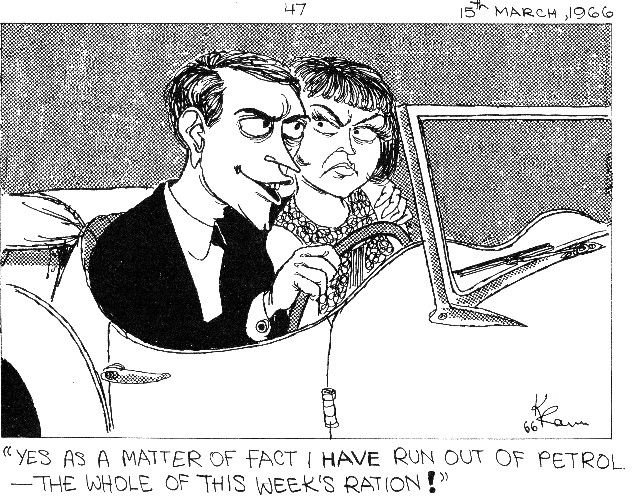
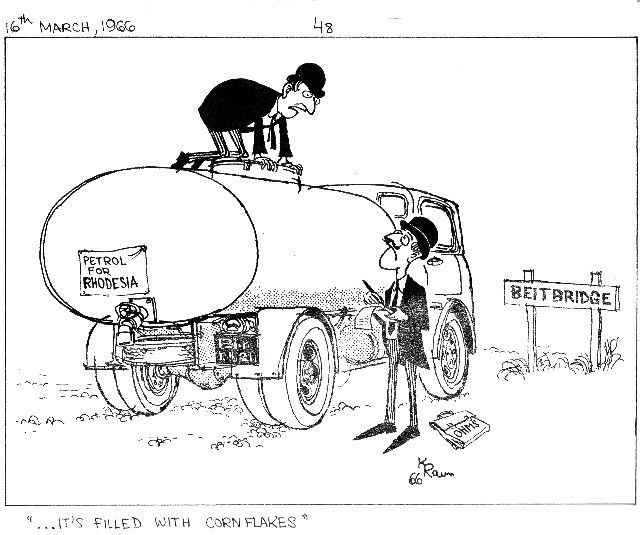
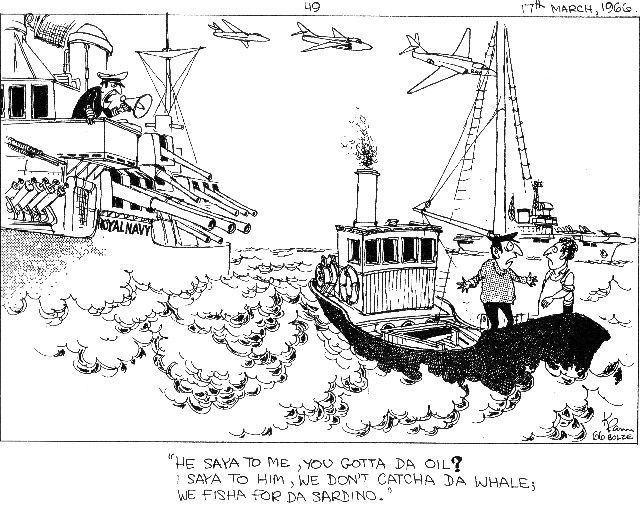
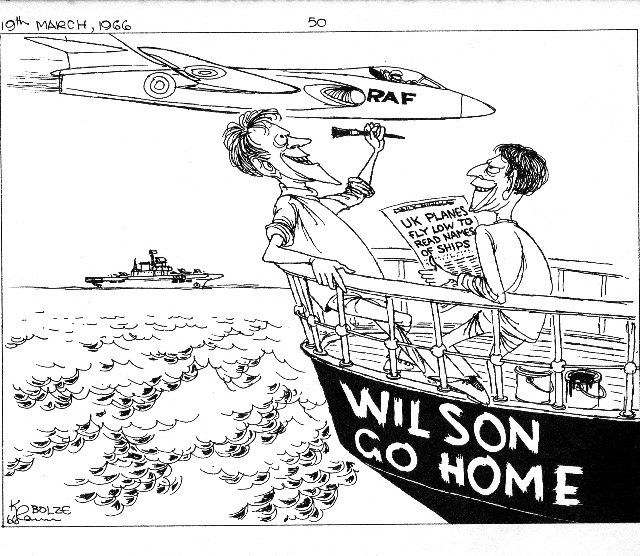
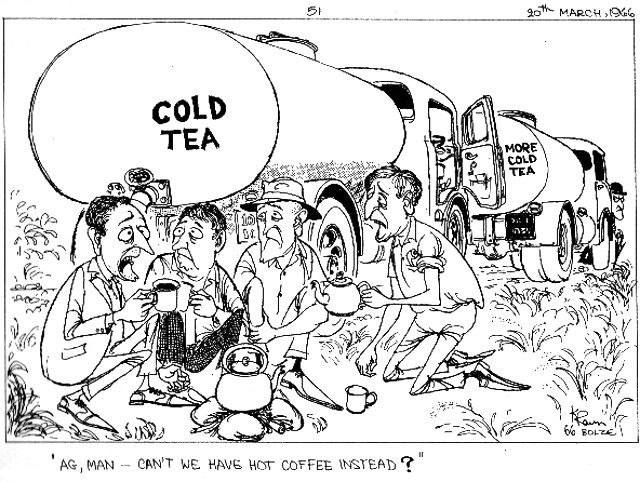
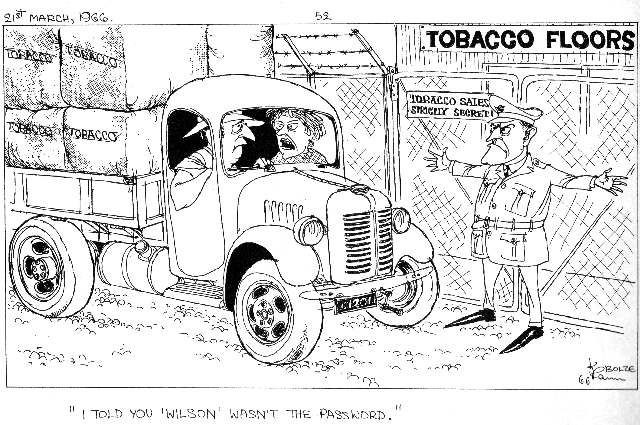
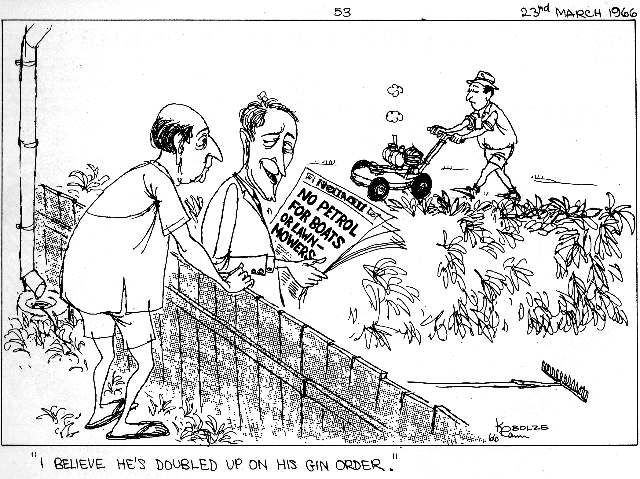
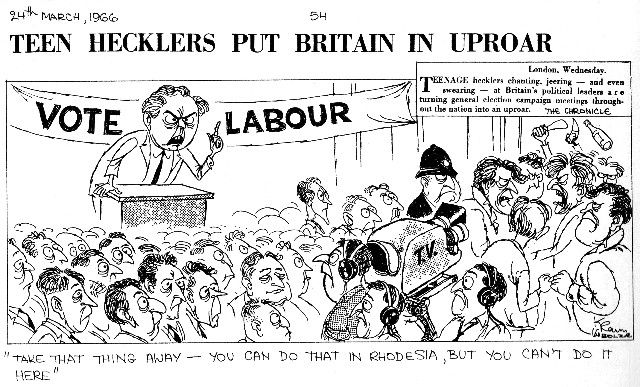
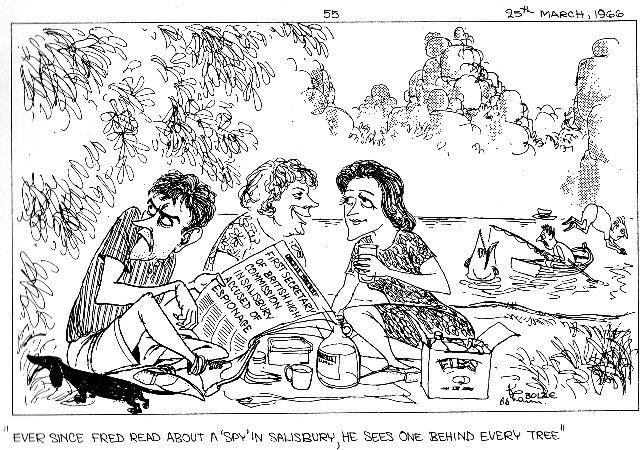
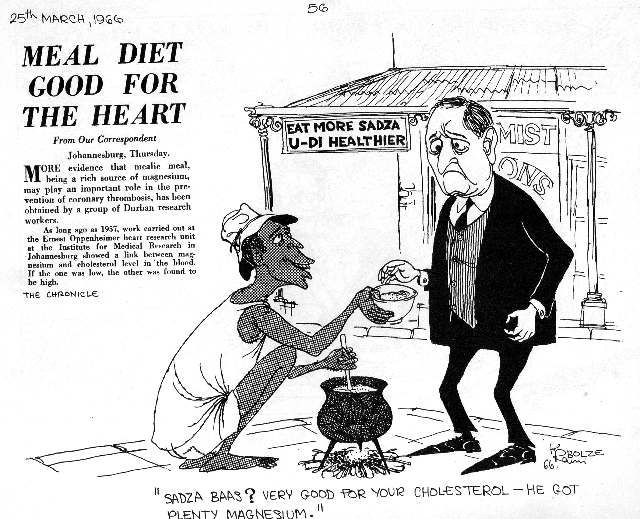
MEAL DIET GOOD FOR THE HEART
From Our Correspondent Johannesburg, Thursday.
MORE evidence that mealie meal, being a rich source of magnesium, may play an important role in the prevention of coronary thrombosis, has been obtained by a group of Durban research workers.
As long ago as 1957, work carried out at the Ernest Oppenheimer heart research unit at the Institute for Medical Research in Johannesburg showed a link between magnesium and cholesterol level in the blood. If the one was low, the other was found to be high.
THE CHRONICLE
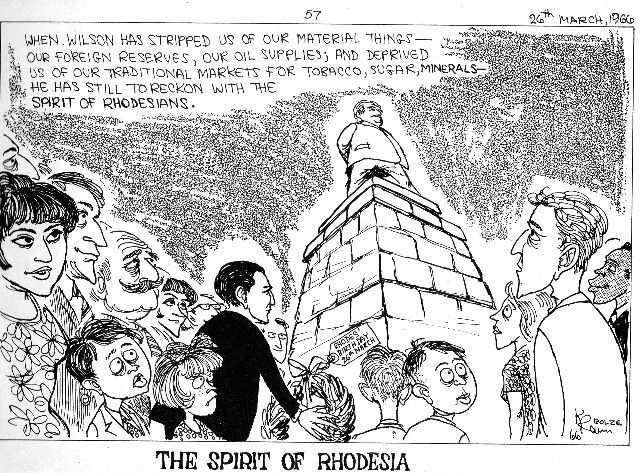
Text Reads:
When Wilson has stripped us of our material things - our foreign reserves, our oil supplies; and deprived us of our traditional markets for tobacco, sugar, minerals - he has still to reckon with the Spirit of Rhodesians.
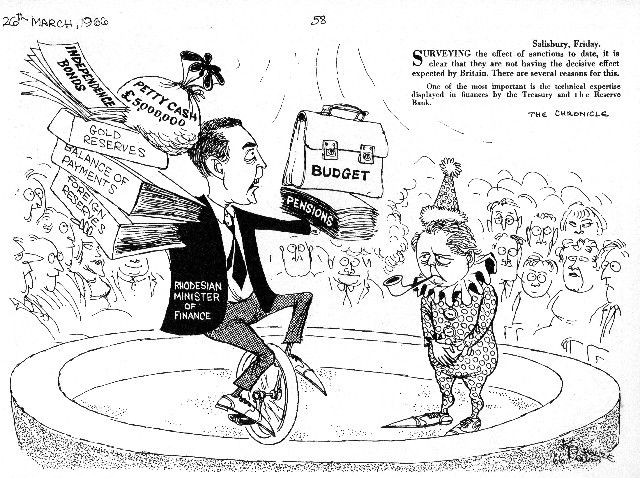
Text Reads:
One of the most important is the technical expertisev displayed in finances by the Treasury and the Reserve Bank."
The Chronicle
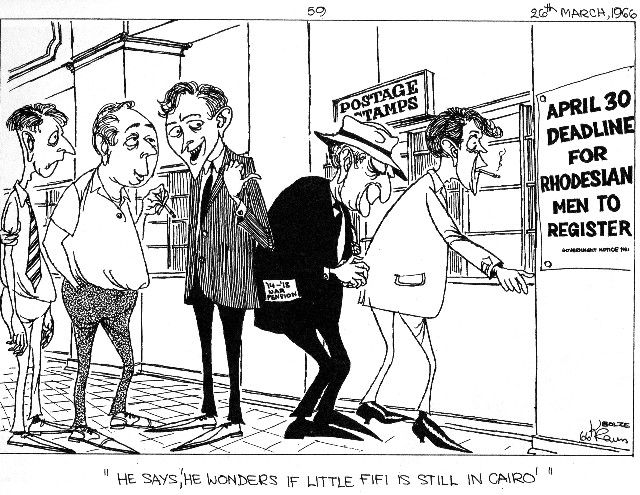
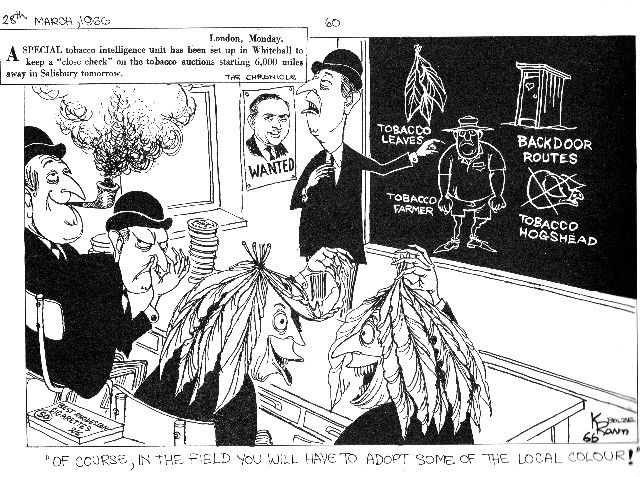
Text Reads:
London, Monday.
A SPECIAL tobacco intelligence unit has been set up in Whitehall to keep a "close check" on the tobacco auctions starting 6,000 jniles away in Salisbury tomorrow. The Chronicle
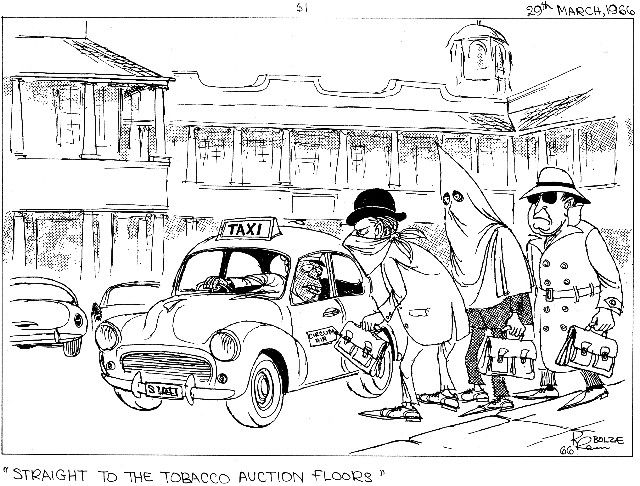
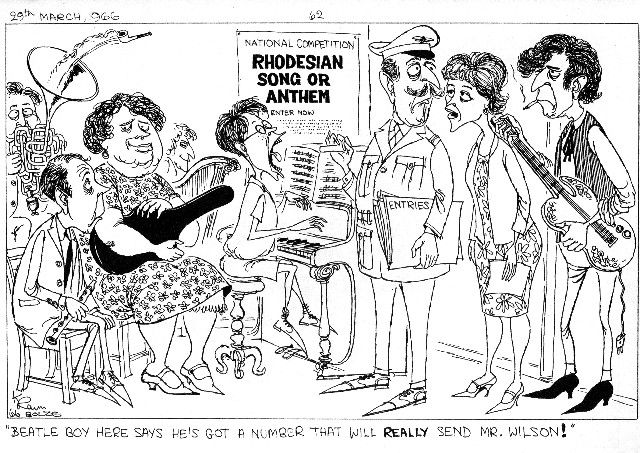
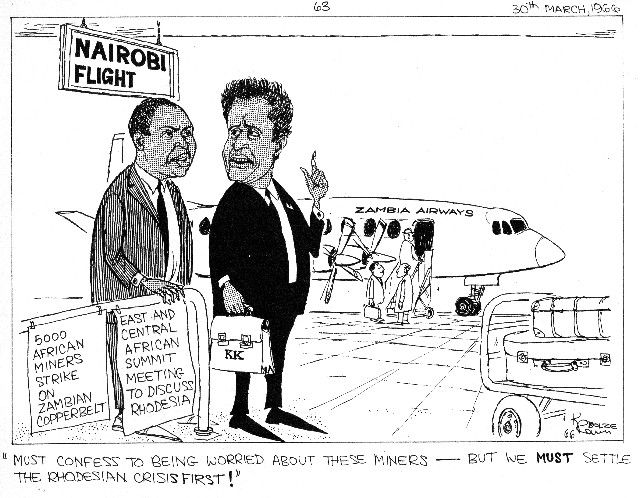
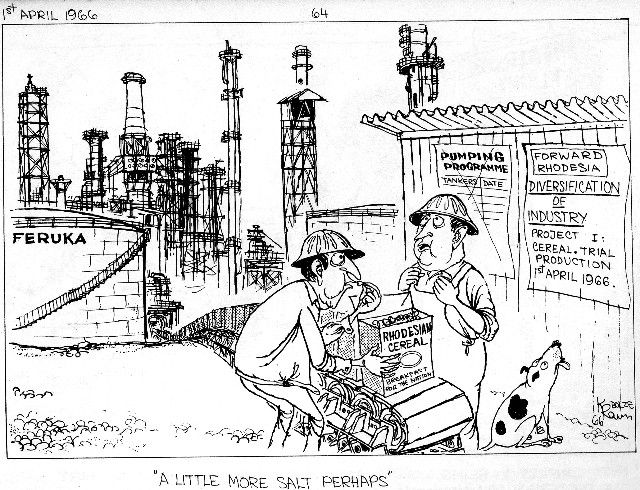
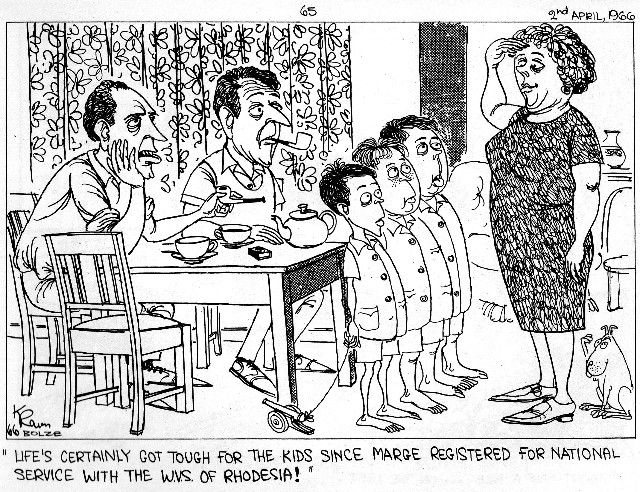
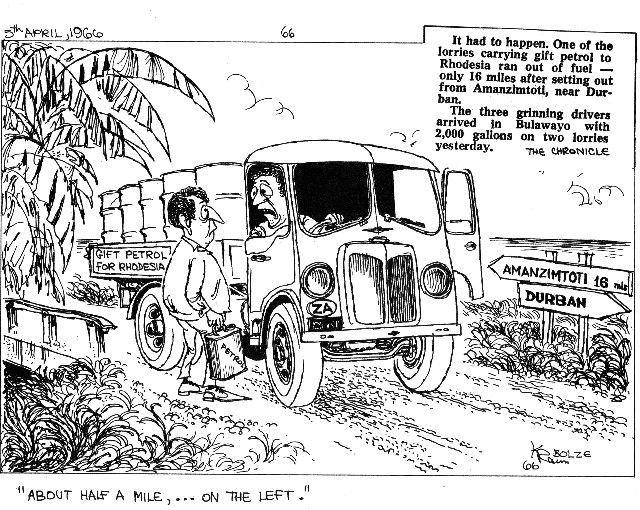
Text Reads
It had to happen. One of the lorries carrying gift petrol to Rhodesia ran out of fuel — only 16 miles after setting out from Amanzimtoti, near Durban.
The three grinning drivers in Bulawayo with 2,000 gallons on two lorries yesterday.
Chronicle
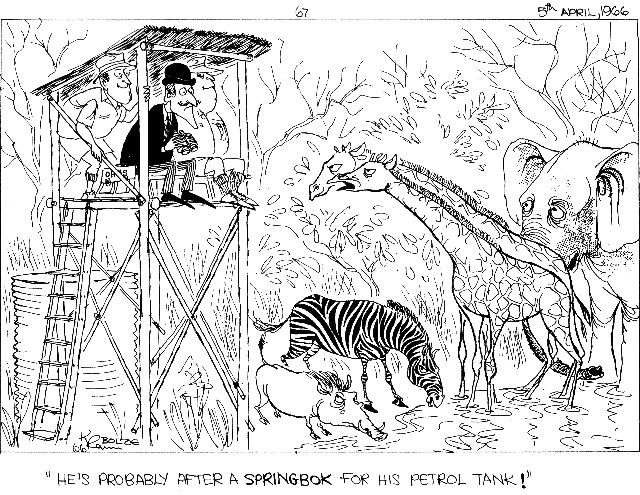
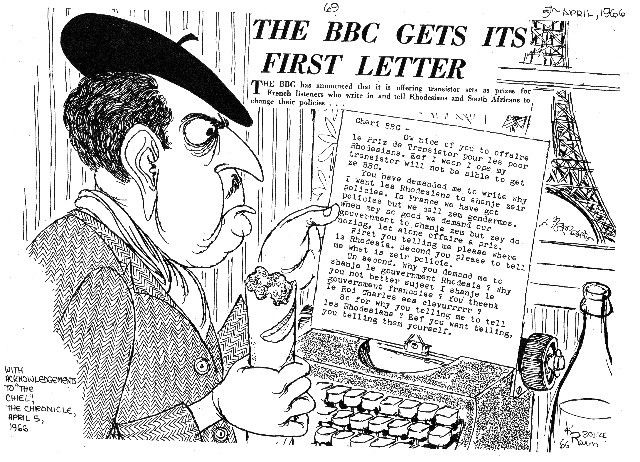
Text Reads;
The BBC has announced that it is offering transistor sets as prizes for French listeners who write in and tell Rhodesians and South Africans to change their policies.
Newspaper Text Reads:
Cheri BBC -
Ow of you to offaIre 1e Priz de Translator pour les poor Rhodesians. Eef I ween I ope my transistor will not be alble to get ze BB C .
You have demanded me to write why I want les Rhodeslana to shanje zelr policies. In France we have got policies but we call zem gendarmes. when zey no good we demand our gouverment to shanje zem but zey do nozlng, let alone offaire a prlz.
First you telling me please where is Rhodesia. Second you please to tell me what is zeir police.
Un second. Why you demand me to shanje le government Rhodesia ? Why you not better suject I shange le gouvernment francaisie-?--You theenk le Roi Charles ees clevurrrrr"
So for why you telling me to tell les Rhodesians? Eef you want telling you telling them yourself.
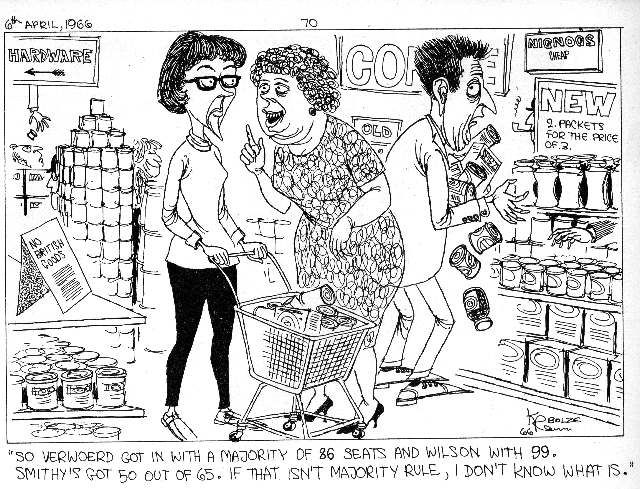 /''
/''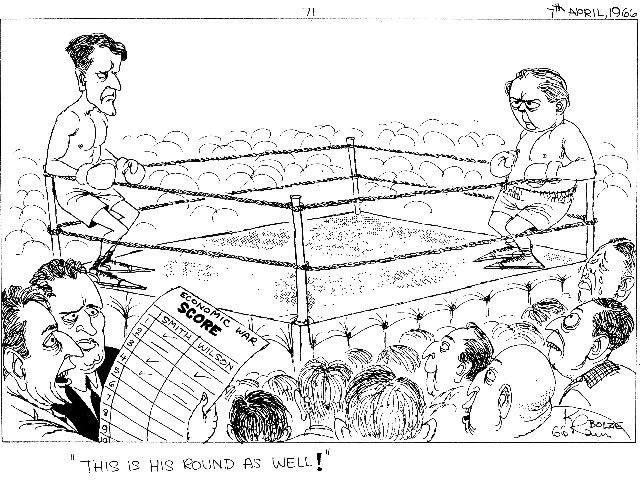
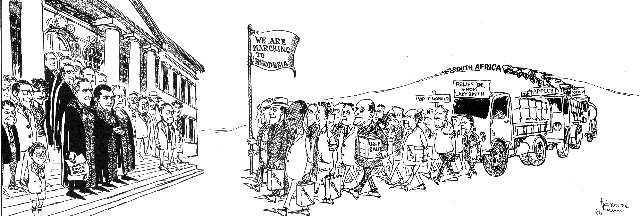
The Gesture Magnificent - The Friends of Rhodesia.
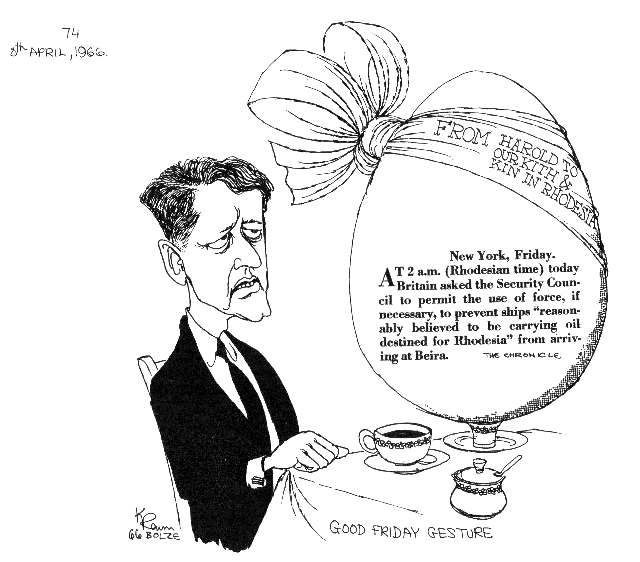
Text Reads:
New York, Friday.
AT 2 a.m. (Rhodesian time) today Britain asked the Security Council to permit the use of force, if necessary, to prevent ships "reasonably believed to be carrying oil
destined for Rhodesia" from arriving at Beira.
The Chronicle
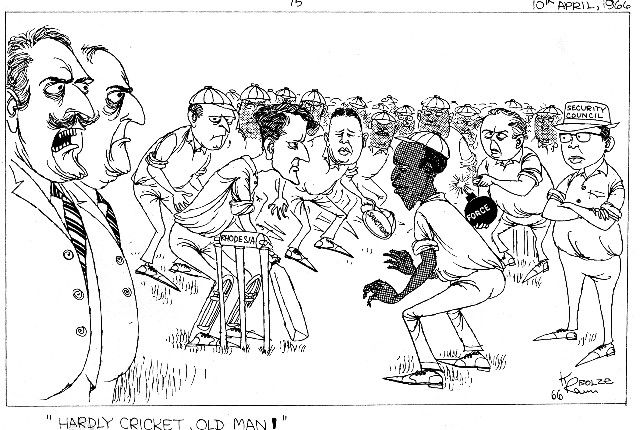
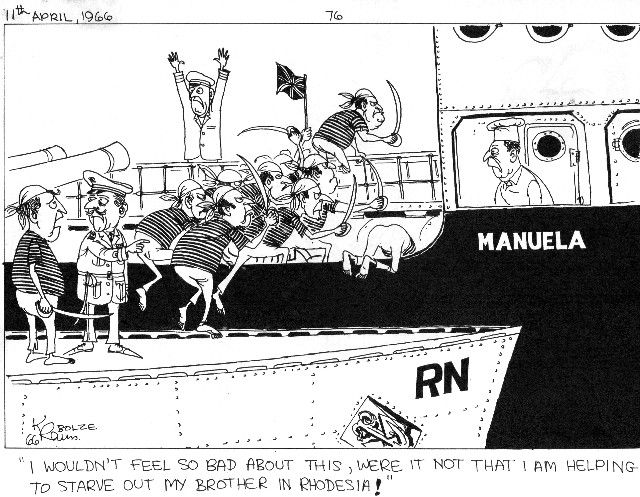
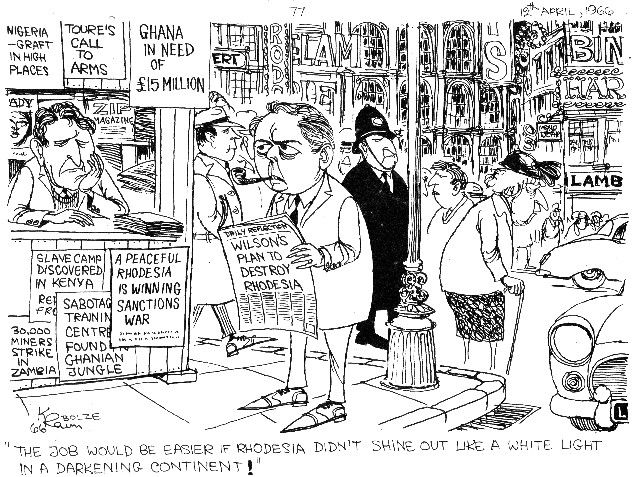
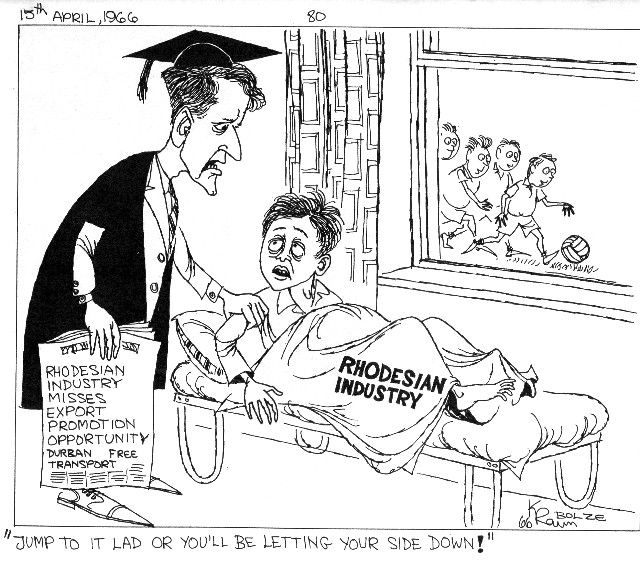
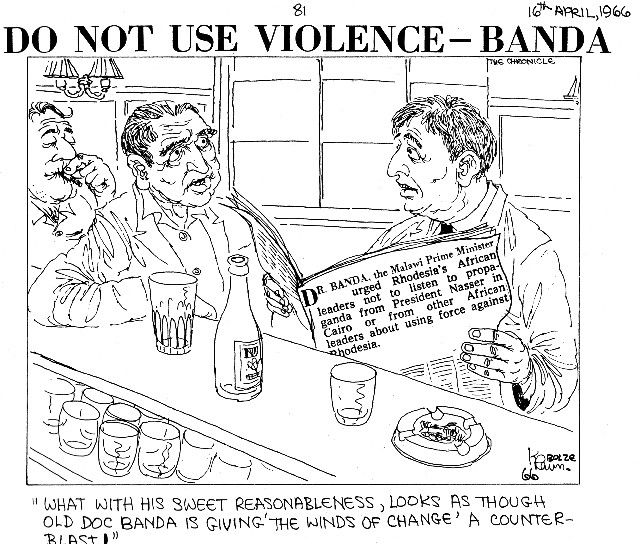
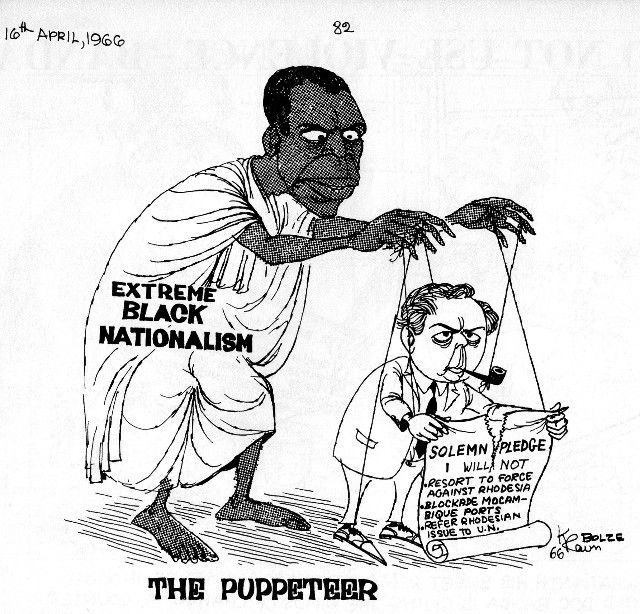
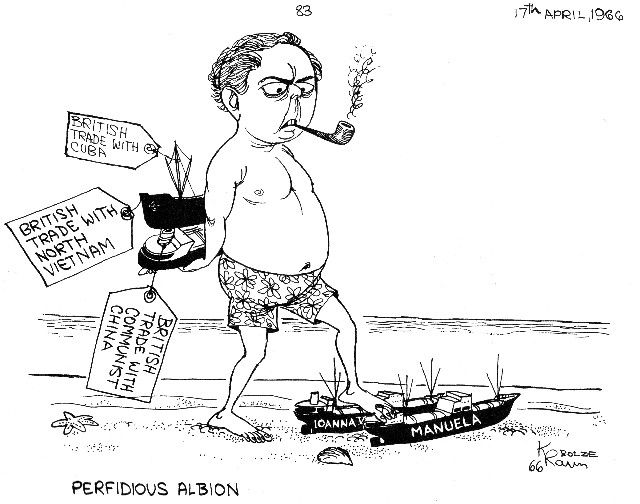
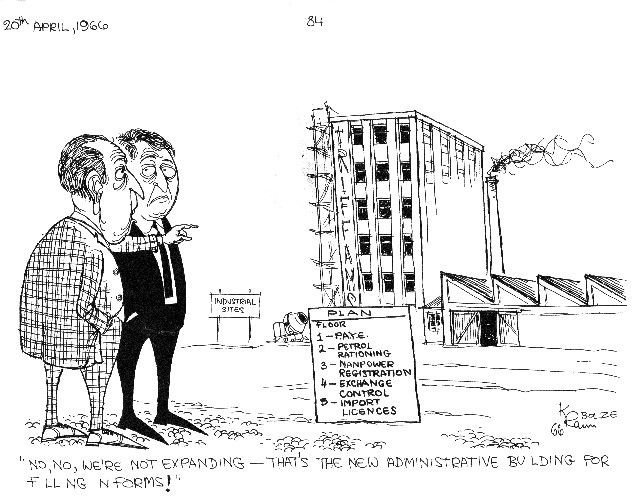
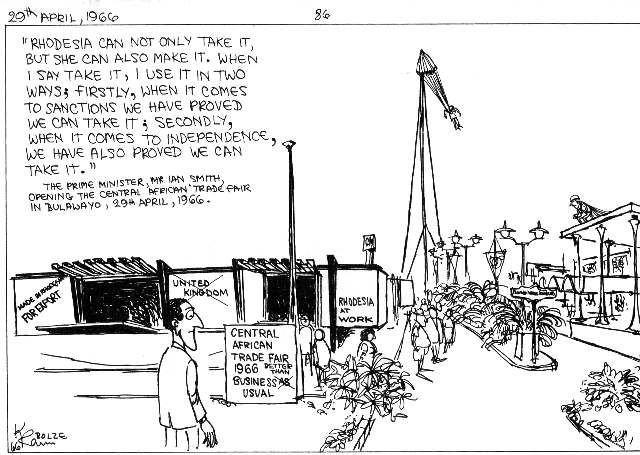
Text Reads:
'Rhodesia can not only take it, but she can also make it. When= I say take it, I use it in two ways,
firstly, when we have proved we can make it; secondly, when it comes to Independence, we have also proved we can take it.
(The Prime Minister, Mr. Ian Smith opening the Central African Trade
Fair in Bulawayo, 29th April 1966.
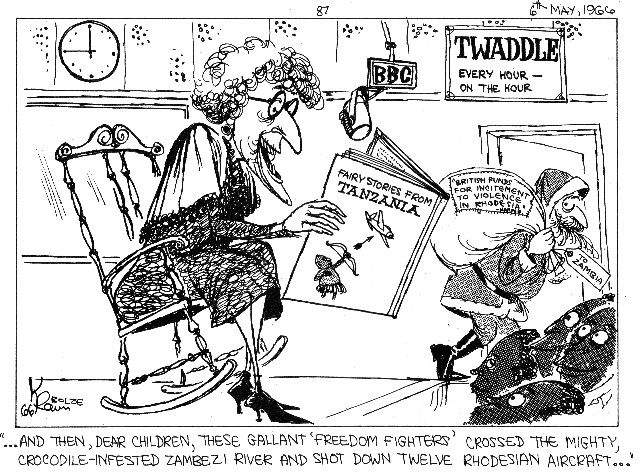
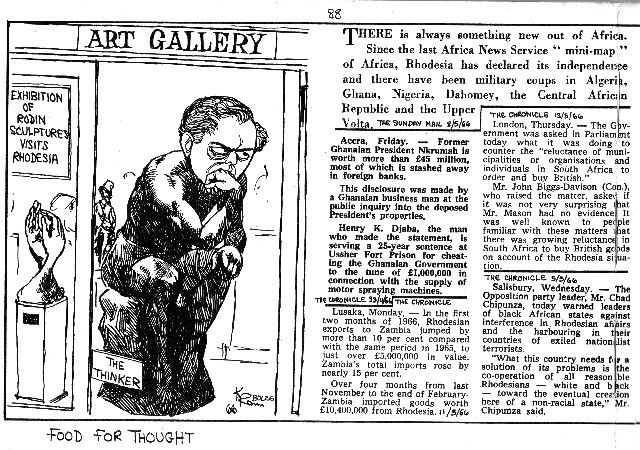
Text Reads:
1. THERE is always something new out of Africa. Since the last Africa News Service " mini-map of Africa, Rhodesia has declared its independence and there have been military coups in Algeria, Ghana, Nigeria, Dahomey, the Central African Republic and the Upper Volta.
The Sunday Mail 8/5/66
2. Accra, Friday. — Former Ghanaian President Nkrumah is worth more than £45 million, most of which is stashed away in foreign banks.
This disclosure was made by a Ghanaian business man at the public inquiry into the deposed President's properties.
Henry K. Djaba, the man who made the statement, is serving a 25-year sentence at Ussher Fort Prison for cheating the Ghanaian Government to the tune of £1,000,000 in connection with the supply of
motor spraying machines. The Chronicle 23/4/66
3. Lusaka, Monday. — In the first two months of 1966, Rhodesian exports to Zambia jumped by more than 10 per cent compared with the same period in 1965, to just over £5,000,000 in value. Zambia's total imports rose by nearly 15 per cent.
Over four months from last November to the end of February. Zambia imported goods worth£10,400,000 from Rhodesia.
The Chronicle 11/5/66
4, London, Thursday. — The Government was asked in Parliament today what it was doing to counter the "reluctance of municipalities or organisations and individuals in South Africa to order and buy British."
Mr. John Biggs-Davison (Con.), who raised the matter, asked if it was not very surprising that Mr. Mason had no evidence. It was well known to people familiar with these matters that
there was growing reluctance in South Africa to buy British goods on account of the Rhodesia situation.
The Chronicle 13/5/66
Salisbury, Wednesday. — The Opposition party leader, Mr. Chad Chipunza, today warned leaders of black African states against interference in Rhodesian affairs and the harbouring in their countries of exiled nation, list terrorists.
"What this country needs for a solution of its problems is the co-operation of all reasonble Rhodesians — white and black — toward the eventual creation here of a non-racial state," Mr. Chipunza said.
The Chronicle 5/5/66
1.Lusaka, Sunday.—The replacement of the Royal Air Force's 51st Field Squadron in Zambia by the 16th Field Squadron from England might be because RAF men here are expressing sympathy for Mr. Smith, a Zambia News report suggests today.
The front page report says the move was classified as routine, but adds that the change has come "amid evidence that many of the RAF men in Zambia are expressing sympathy for the rebels in Rhodesia."
African areas were out of bounds to the RAF, and their social contacts were limited to Europeans, said the report.
In bars, private homes and RAF messes men had openly talked of support for UDI.
The report quotes two RAF men as saying Zambian whites mainly supported Mr. Smith and a lot of them were sympathetic to his Government and thought his policies were right.— Iana.
The Chronicle 9/5/66.
2. THIRTY RAIL tankers to enable Malawi Railways to step up the emergency oil lift to Zambia will be off-loaded this afternoon in the Beira Docks from the Japanese freighter Koshu Maru.
Zambia is believed to be planning to pay for the tankers with emergency aid from Britain totalling £30,000.000.
Times of Zambia 22/4/66
3. CHALLENGE TO U.N. SUGGESTED
SIR,—I would like to suggest to Mr. Ian Smith that he should Issue a challenge to the United
Nations Security Council asking them to prove that Rhodesia Is not one of the most peaceful, non-aggressive countries in the world, with better race relations than any of the African States which accuse Rho- desia of endangering world peace.
S. A. E. HURST.
Salisbury.
The Rhodesia Herald 21/4/6
4. Salisbury, Friday. — Because an African family did not see eye to eye with banned ZAPU's militant group they were attacked by a mob brandishing sticks and knobkerries and the aged father was fatally injured, it was stated in Salisbury regional court today when one of the gang, Marko Chirimuta, was jailed for five years.
The struggle began when the father refused demands that he attend a meeting of the Zhanda
group of ZAPU.
The Chronicle 7/5/66
5.Sir, — That Rhodesia should even be considered a threat to world peace is comical.
There is a situation in Vietnam that could at any moment blaze into a direct war between the United States and China. Ghana is threatened with invasion from Guinea.
Pakistan receives military aid from China, which will be used against India.
The OAU threatens Rhodesia, Portugal and South Africa.
Tanzania trains rebels to be used against Malawi.
India is continually having border disputes with China.
Britain is given the power by the U.N. to use force against tankers carrying oil for Rhodesia.
Indonesia continues her verbal and material war against Malaysia.
Numerous African governments are overthrown by military coups.
If these above-mentioned situations are not a threat to world peace, then the only possible way to end this letter Is to say, "Stop this crazy world, I want to get off."
B. J. DU TOIT.
Famona.
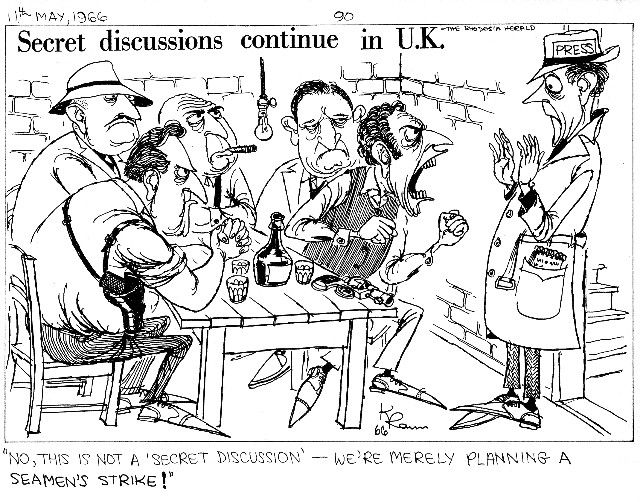
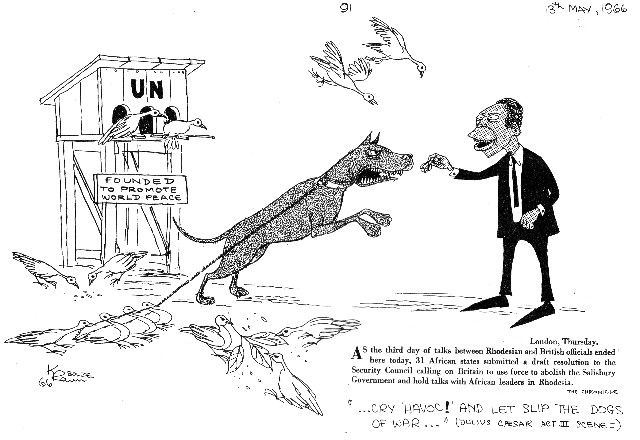
Text Reads:
London, Thursday: As the third day of talks between Rhodesian and British officials ended here today, 31 African states submitted a draft resolution to the Security Council calling on Britain to use force to abolish the Salisbury Government and hold talks with African leaders in Rhodesia.
Chronicle
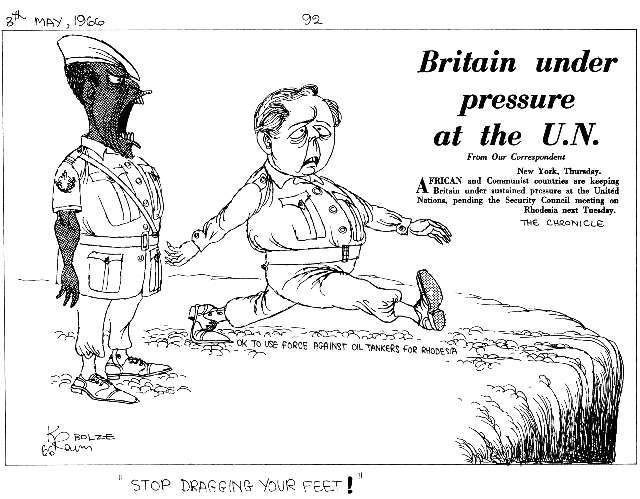 /"
/"Text Reads:
From Our Correspondent
New York, Thursday.
AFRICAN and Communist countries are keeping Britain under sustained pressure at the United Nations, pending the Security Council meeting on Rhodesia next Tuesday.
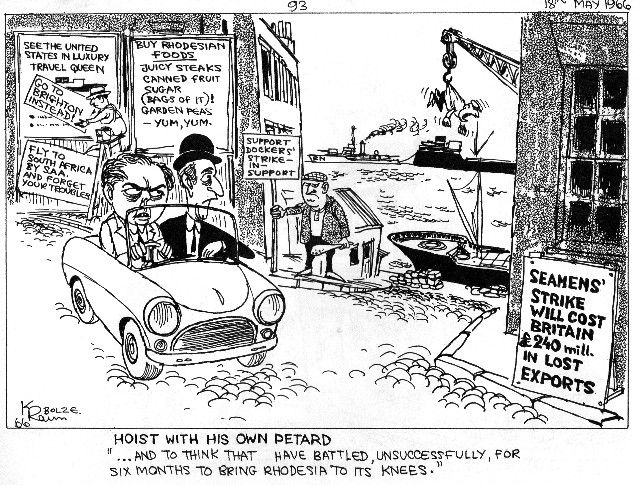
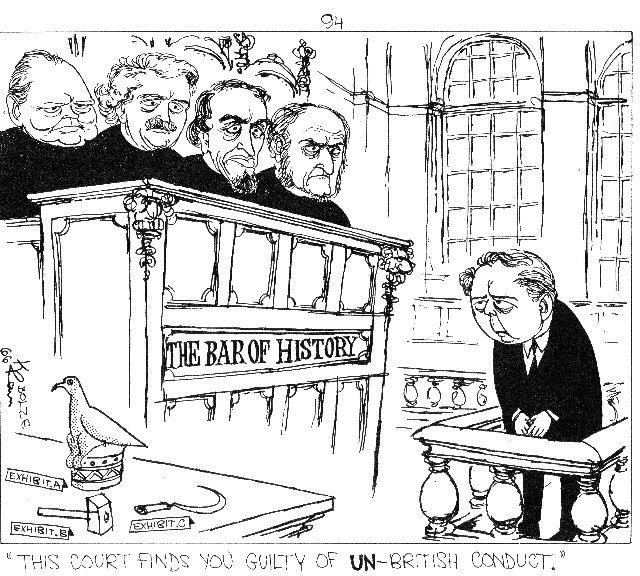
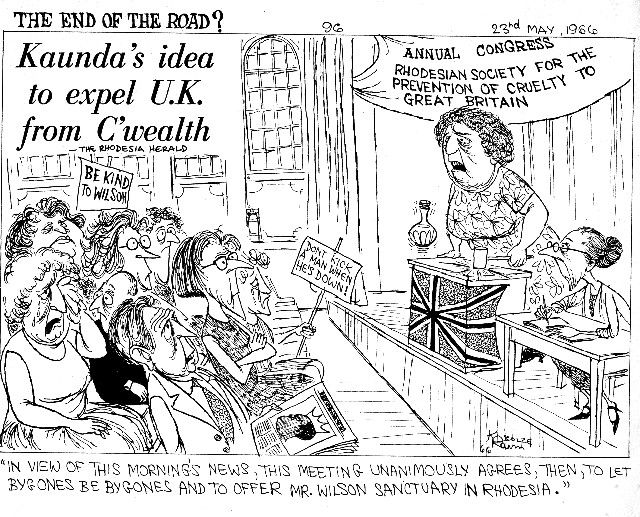
End of Publication
Extracted and recompiled by Eddy Norris for use on Our Rhodesian Heritage Blog. No financial gain is expected not intended from this but rather to retain the memories of Rhodesia.
Scanned material of this publication was made available by Darryl and Maureeen Burlin. Thanks folks
Eddy Norris
Irene South Africa
August 20102
Comments are always welcome - send them to Eddy Norris at orafs11@gmail.com


0 Comments:
Post a Comment
Subscribe to Post Comments [Atom]
<< Home